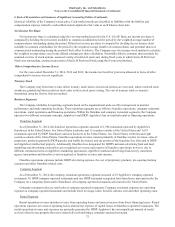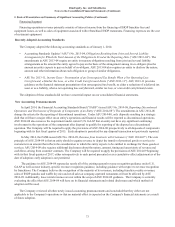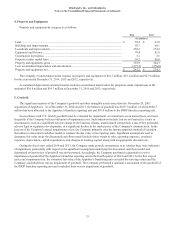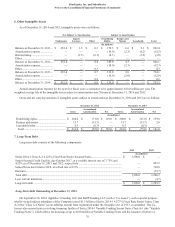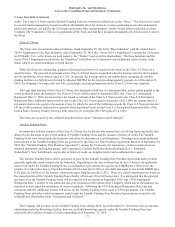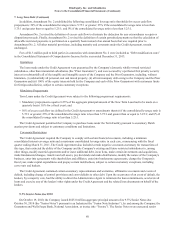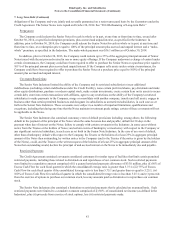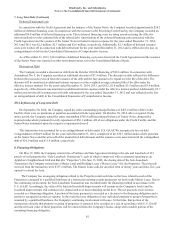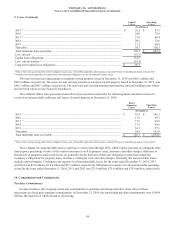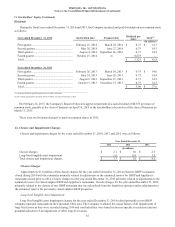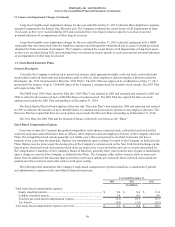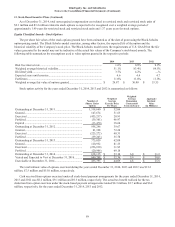IHOP 2014 Annual Report Download - page 100
Download and view the complete annual report
Please find page 100 of the 2014 IHOP annual report below. You can navigate through the pages in the report by either clicking on the pages listed below, or by using the keyword search tool below to find specific information within the annual report.
DineEquity, Inc. and Subsidiaries
Notes to the Consolidated Financial Statements (Continued)
7. Long-Term Debt (Continued)
81
obligations of the Company and were jointly and severally guaranteed on a senior unsecured basis by the Guarantors under the
Credit Agreement. The Senior Notes were repaid on October 30, 2014. See “2014 Refinancing of Long-term Debt.”
Prepayment
The Company could redeem the Senior Notes for cash in whole or in part, at any time or from time to time, on and after
October 30, 2014, at specified redemption premiums, plus accrued and unpaid interest, as specified in the Indenture. In
addition, prior to October 30, 2014, the Company could redeem the Senior Notes for cash in whole or in part, at any time and
from time to time, at a redemption price equal to 100% of the principal amount plus accrued and unpaid interest and a “make-
whole” premium, as specified in the Indenture. The make-whole payment was $36.1 million as of October 30, 2014.
In addition, prior to October 30, 2013, the Company could redeem up to 35% of the aggregate principal amount of Senior
Notes issued with the net proceeds raised in one or more equity offerings. If the Company underwent a change of control under
certain circumstances, the Company could have been required to offer to purchase the Senior Notes at a purchase price equal to
101% of the principal amount plus accrued and unpaid interest. If the Company sells assets under certain circumstances, the
Company could have been required to offer to purchase the Senior Notes at a purchase price equal to 100% of the principal
amount plus accrued and unpaid interest.
Covenants/Restrictions
The Senior Note Indenture limited the ability of the Company and its restricted subsidiaries to incur additional
indebtedness (excluding certain indebtedness under the Credit Facility), issue certain preferred shares, pay dividends and make
other equity distributions, purchase or redeem capital stock, make certain investments, create certain liens on its assets to secure
certain debt, enter into certain transactions with affiliates, agree to any restrictions on the ability of the Company's restricted
subsidiaries to make payments to the Company, merge or consolidate with another company, transfer and sell assets, engage in
business other than certain permitted businesses and designate its subsidiaries as unrestricted subsidiaries, in each case as set
forth in the Senior Note Indenture. These covenants were subject to a number of important limitations, qualifications and
exceptions, including that during any time that the Notes maintain investment grade ratings, certain of these covenants will not
be applicable to the Notes.
The Senior Note Indenture also contained customary event of default provisions including, among others, the following:
default in the payment of the principal of the Notes when the same becomes due and payable; default for 30 days in the
payment when due of interest on the Notes; failure to comply with certain covenants in the Indenture, in some cases without
notice from the Trustee or the holders of Notes; and certain events of bankruptcy or insolvency with respect to the Company or
any significant restricted subsidiary, in each case as set forth in the Senior Note Indenture. In the case of an event of default,
other than a bankruptcy default with respect to the Company, the Trustee or the holders of at least 25% in aggregate principal
amount of the Notes then outstanding, by written notice to the Company (and to the Trustee if the notice is given by the holders
of the Notes), could, and the Trustee at the written request of the holders of at least 25% in aggregate principal amount of the
Notes then outstanding would, declare the principal of and accrued interest on the Notes to be immediately due and payable.
Restricted Payments
The Credit Agreement contained covenants considered customary for similar types of facilities that limit certain permitted
restricted payments, including those related to dividends on and repurchases of our common stock. Such restricted payments
were limited to a cumulative amount comprised of (i) a general restricted payments allowance of $35.0 million, plus (ii) 50% of
Excess Cash Flow for each fiscal quarter in which the consolidated leverage ratio is greater than 5.75:1; (iii) 75% of Excess
Cash Flow for each fiscal quarter if the consolidated leverage ratio is less than 5.75:1 and greater than or equal to 5.25:1; (iv)
100% of Excess Cash Flow for each fiscal quarter in which the consolidated leverage ratio is less than 5.25:1; and (v) proceeds
from the exercise of options to purchase our common stock, less any amounts paid as dividends or to repurchase our common
stock.
The Senior Note Indenture also contained a limitation on restricted payments that is calculated on an annual basis. Such
restricted payments were limited to a cumulative amount comprised of (i) 50% of consolidated net income (as defined in the
Indenture), plus (ii) proceeds from exercise of stock options, less (iii) restricted payments made.



